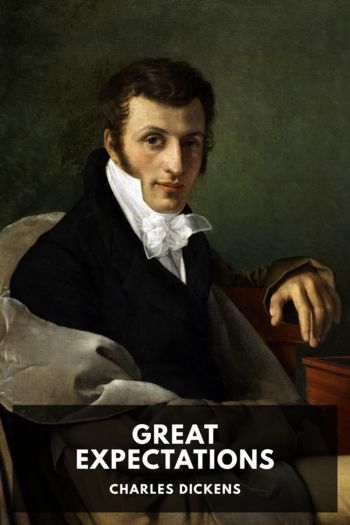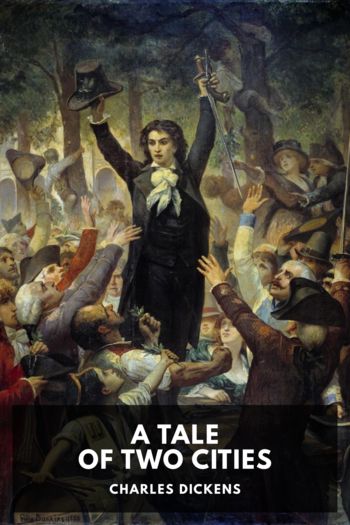Great Expectations by Charles Dickens (e textbook reader .txt) 📕

- Author: Charles Dickens
Book online «Great Expectations by Charles Dickens (e textbook reader .txt) 📕». Author Charles Dickens
“When we was put in the dock, I noticed first of all what a gentleman Compeyson looked, wi’ his curly hair and his black clothes and his white pocket handkercher, and what a common sort of a wretch I looked. When the prosecution opened and the evidence was put short, aforehand, I noticed how heavy it all bore on me, and how light on him. When the evidence was giv in the box, I noticed how it was always me that had come for’ard, and could be swore to, how it was always me that the money had been paid to, how it was always me that had seemed to work the thing and get the profit. But when the defence come on, then I see the plan plainer; for, says the counsellor for Compeyson, ‘My lord and gentlemen, here you has afore you, side by side, two persons as your eyes can separate wide; one, the younger, well brought up, who will be spoke to as such; one, the elder, ill brought up, who will be spoke to as such; one, the younger, seldom if ever seen in these here transactions, and only suspected; t’other, the elder, always seen in ’em and always wi’ his guilt brought home. Can you doubt, if there is but one in it, which is the one, and, if there is two in it, which is much the worst one?’ And suchlike. And when it come to character, warn’t it Compeyson as had been to the school, and warn’t it his schoolfellows as was in this position and in that, and warn’t it him as had been know’d by witnesses in such clubs and societies, and nowt to his disadvantage? And warn’t it me as had been tried afore, and as had been know’d up hill and down dale in Bridewells and Lockups! And when it come to speechmaking, warn’t it Compeyson as could speak to ’em wi’ his face dropping every now and then into his white pocket handkercher—ah! and wi’ verses in his speech, too—and warn’t it me as could only say, ‘Gentlemen, this man at my side is a most precious rascal’? And when the verdict come, warn’t it Compeyson as was recommended to mercy on account of good character and bad company, and giving up all the information he could agen me, and warn’t it me as got never a word but Guilty? And when I says to Compeyson, ‘Once out of this court, I’ll smash that face of yourn!’ ain’t it Compeyson as prays the Judge to be protected, and gets two turnkeys stood betwixt us? And when we’re sentenced, ain’t it him as gets seven year, and me fourteen, and ain’t it him as the Judge is sorry for, because he might a done so well, and ain’t it me as the Judge perceives to be a old offender of wiolent passion, likely to come to worse?”
He had worked himself into a state of great excitement, but he checked it, took two or three short breaths, swallowed as often, and stretching out his hand towards me said, in a reassuring manner, “I ain’t a going to be low, dear boy!”
He had so heated himself that he took out his handkerchief and wiped his face and head and neck and hands, before he could go on.
“I had said to Compeyson that I’d smash that face of his, and I swore Lord smash mine! to do it. We was in the same prison-ship, but I couldn’t get at him for long, though I tried. At last I come behind him and hit him on the cheek to turn him round and get a smashing one at him, when I was seen and seized. The black-hole of that ship warn’t a strong one, to a judge of black-holes that could swim and dive. I escaped to the shore, and I was a hiding among the graves there, envying them as was in ’em and all over, when I first see my boy!”
He regarded me with a look of affection that made him almost abhorrent to me again, though I had felt great pity for him.
“By my boy, I was giv to understand as Compeyson was out on them marshes too. Upon my soul, I half believe he escaped in his terror, to get quit of me, not knowing it was me as had got ashore. I hunted him down. I smashed his face. ‘And now,’ says I ’as the worst thing I can do, caring nothing for myself, I’ll drag you back.’ And I’d have swum off, towing him by the hair, if it had come to that, and I’d a got him aboard without the soldiers.
“Of course he’d much the best of it to the last—his character was so good. He had escaped when he was made half wild by me and my murderous intentions; and his punishment was light. I was put in irons, brought to trial again, and sent for life. I didn’t stop for life, dear boy and Pip’s comrade, being here.”
He wiped himself again, as he had done before, and then slowly took his tangle of tobacco from his pocket, and plucked his pipe from his buttonhole, and slowly filled it, and began to smoke.
“Is he dead?” I asked, after a silence.
“Is who dead, dear boy?”
“Compeyson.”
“He hopes I am, if he’s alive, you may be sure,” with a fierce look. “I never heerd no more of him.”
Herbert had been writing with his pencil in the cover of a book. He softly pushed the book over to me, as Provis stood smoking with his eyes on the fire, and I read in it:—
“Young Havisham’s name was Arthur. Compeyson





Comments (0)